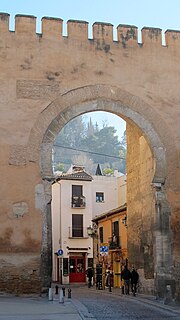
An ecumenical council is a conference of ecclesiastical dignitaries and theological experts convened to discuss and settle matters of Church doctrine and practice in which those entitled to vote are convoked from the whole world (oikoumene) and which secures the approbation of the whole Church.

The First Council of Nicaea was a council of Christian bishops convened in the Bithynian city of Nicaea by the Roman Emperor Constantine I in AD 325.

The Second Council of Constantinople is the fifth of the first seven ecumenical councils recognized by both the Eastern Orthodox Church and the Roman Catholic Church. It is also recognized by the Old Catholics and others. Protestant opinions and recognition of it are varied. Some Protestants, such as Calvinists and Lutherans, recognize the first four councils, whereas most Anglo-Catholics accept all seven. Constantinople II was convoked by the Byzantine Emperor Justinian I under the presidency of Patriarch Eutychius of Constantinople. It was held from 5 May to 2 June 553. Participants were overwhelmingly Eastern bishops—only sixteen Western bishops were present, including nine from Illyricum and seven from Africa, but none from Italy—out of the 152 total.

The Third Council of Constantinople, counted as the Sixth Ecumenical Council by the Eastern Orthodox and Catholic Churches, as well by certain other Western Churches, met in 680/681 and condemned monoenergism and monothelitism as heretical and defined Jesus Christ as having two energies and two wills.

The Church of Sweden is an Evangelical Lutheran national church in Sweden. A former state church, headquartered in Uppsala, with 6.0 million baptised members at year end 2017 it is the largest Christian denomination in Sweden.
Paul of Samosata was Bishop of Antioch from 260 to 268. He was a believer in monarchianism, a nontrinitarian doctrine; his teachings reflect adoptionism.

Saint Meletius of Antioch (Μελέτιος) was a Christian bishop, or Patriarch of Antioch, from 360 until his death. There were contrasting views about his theological position: on the one hand, he was exiled three times under Arian emperors; on the other, he was strongly opposed by those faithful to the memory of the staunchly pro-Nicene Eustathius of Antioch, whom the synod of Melitene deposed for his Homousianism, which they considered a heresy, and by Saint Athanasius of Alexandria, the firm opponent of Arianism. One of his last acts was to preside over the First Council of Constantinople in 381.
In the history of Christianity and later of the Roman Catholic Church, there have been several Councils of Aquileia. The Roman city of Aquileia at the head of the Adriatic is the seat of an ancient episcopal see, seat of the Patriarch of Aquileia.

The Synod of Elvira was an ecclesiastical synod held at Elvira in the Roman province of Hispania Baetica, now Granada in southern Spain. Its date has not been exactly determined but is believed to be in the first quarter of the fourth century, approximately 305–6. It was one of three councils, together with the Synod of Arles (314) and the Synod of Ancyra, that first approached the character of general councils and prepared the way for the first ecumenical council. It was attended by nineteen bishops and twenty-six presbyters, mostly resident in Baetica. Deacons and laymen were also present. Eighty-one canons are recorded, although it is believed that many were added at later dates. All concern order, discipline and conduct among the Christian community. Canon 36, forbidding the use of images in churches, became a bone of contention between Catholic and Protestant scholars after the Protestant Reformation.

The Quinisext Council was a church council held in 692 at Constantinople under Justinian II. It is often known as the Council in Trullo, because like the Sixth Ecumenical Council it was held in a domed hall in the Imperial Palace. Both the Fifth and the Sixth Ecumenical Councils had omitted to draw up disciplinary canons, and as this council was intended to complete both in this respect, it took the name of Quinisext, i.e. the Fifth-Sixth Council. It was attended by 215 bishops, all from the Eastern Roman Empire. Basil of Gortyna in Crete, however, belonged to the Roman patriarchate and called himself papal legate, though no evidence is extant of his right to use that title.
Acacius of Beroea, a Syrian, lived in a monastery near Antioch, and, for his active defense of the Church against Arianism, was made Bishop of Berroea in 378 AD, by Eusebius of Samosata.
The First Council of Orange was held in the diocese of Orange, then part of the Western Roman Empire, in 441. The meeting took place in a church called the ecclesia Justinianensis, under the presidency of Bishop Hilary of Arles. Seventeen bishops attended the meeting, among them Bishop Eucherius of Lyons.

The Councils of Carthage, or Synods of Carthage, were church synods held during the 3rd, 4th, and 5th centuries in the city of Carthage in Africa. The most important of these are described below.
The Council of Agde was a regional synod held in September 506 at Agatha or Agde, on the Mediterranean coast east of Narbonne, in the Septimania region of the Visigothic Kingdom, with the permission of the Visigothic King Alaric II.

Paphnutius of Thebes, also known as Paphnutius the Confessor, was a disciple of Saint Anthony the Great and a bishop of a city in the Upper Thebaid in the early fourth century. He is accounted by some as a prominent member of the First Council of Nicaea which took place in 325. Neither the name of his see nor the precise date of his death are known.
Arles in the south of Roman Gaul hosted several councils or synods referred to as Concilium Arelatense in the history of the early Christian church.
Clerical celibacy is the discipline within the Catholic Church by which only unmarried men are ordained to the episcopate, to the priesthood in some autonomous particular Churches, and similarly to the diaconate. In other autonomous particular Churches, the discipline applies only to the episcopate.
Church councils are formal meetings of bishops and representatives of several churches who are brought together to regulate points of doctrine or discipline. The meetings may be of a single ecclesiastical community or may involve an ecclesiastical province, a nation or other civil region, or the whole Church. Some of those convoked from the Church as a whole have been recognized as ecumenical councils and are considered particularly authoritative. The first ecumenical council is that of Nicaea, called by the Emperor Constantine in 325.

The Lateran Council of 769 was a synod held in the Basilica of St. John Lateran to rectify perceived abuses in the papal electoral process which had led to the elevation of the Antipopes Constantine II and Philip. It also condemned the rulings of the Council of Hieria. It is perhaps the most important Roman council held during the 8th century.
The public domain consists of all the creative works to which no exclusive intellectual property rights apply. Those rights may have expired, been forfeited, expressly waived, or may be inapplicable.

The Encyclopædia Britannica Eleventh Edition (1910–11) is a 29-volume reference work, an edition of the Encyclopædia Britannica. It was developed during the encyclopaedia's transition from a British to an American publication. Some of its articles were written by the best-known scholars of the time. This edition of the encyclopedia, containing 40,000 entries, is now in the public domain, and many of its articles have been used as a basis for articles in Wikipedia. However, the outdated nature of some of its content makes its use as a source for modern scholarship problematic. Some articles have special value and interest to modern scholars as cultural artifacts of the 19th and early 20th centuries.
Jean Hardouin, French classical scholar, was born at Quimper in Brittany.










